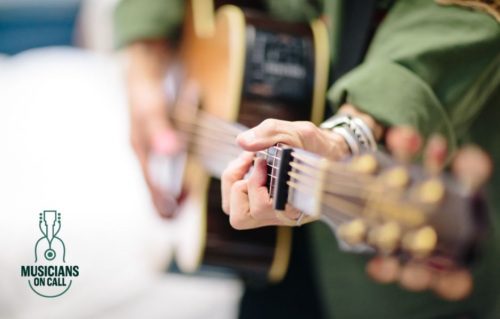
The Transformative Power of Music: Enhancing Dementia and Memory Care through Melody
The human experience is deeply intertwined with the power of music. Its ability to evoke emotions, trigger memories, and foster connections is undeniable. For individuals living with Dementia and memory-related conditions, music goes beyond just entertainment; it becomes a lifeline to the past, a bridge to the present, and a way to human connection.
We spoke to Tracy Raff, Manager of Therapeutic Interventions at TriStar Centennial Parthenon Pavilion, about the benefits of music. “Music offers a variety of benefits to patients living with Dementia. This can be in a cognitive stimulation sense, in physical stimulation, in reminiscing which can be really important with this population. When working with patients with Dementia and with music, the physiological response is amazing. It makes people want to get up and dance, sing, and interact with people.”
MOC partnered up with Dementia Society of America®, an organization whose mission is to enhance the quality of life for those living with Dementia, caregivers, and the community and provides Dementia education and resources. Together, we’ve seen the role music plays in Dementia and memory care and the transformative effects that melodies can have on patients’ lives.
Music can be magicalKevin Jameson, Founder, Dementia Society of America®
Unlocking the Memories
Dementia poses significant challenges for both patients and their caregivers. Memory loss, disorientation, and communication difficulties can lead to frustration and isolation. Yet, remarkably, music has the power to transcend these barriers. It taps into neural pathways that remain intact even in the face of cognitive decline. Familiar tunes from one’s past can act as triggers, unlocking memories and emotions. A song that was loved when young, can transport a patient back in time, bringing back a sense of identity and self.
The Neuroscience of Music
The connection between music and memory goes beyond sentimentality; it’s rooted in neuroscience. Research has shown that musical memories are stored in different regions of the brain than other types of memories. Even as the brain deteriorates, the neural networks responsible for processing music remain relatively preserved. This phenomenon, often referred to as the “music memory” phenomenon, explains why an individual living with advanced Dementia may struggle to recall a conversation from moments ago but can sing along flawlessly to a song from decades past.
When asked about how she’s witnessed this phenomenon when working with patients, Tracy shared, “sometimes there are patients [who] are non-responsive, are completely disengaged, and when their song comes on, they are able to identify it, sing it – maybe even tell you who it’s by. It’s really interesting how the brain makes those neural pathways and is able to take just a sound and identify a memory, a feeling, a person, an interaction all from that sound.”
Emotional Resonance and Well-Being
Beyond its impact on memory recall, music also wields a powerful influence on emotions. It has the capacity to regulate mood and evoke feelings of happiness, calmness, and comfort. For patients facing the journey of living with Dementia, these emotional responses can be invaluable. Music can alleviate anxiety, reduce agitation, and provide a sense of familiarity in an often-confusing world. Caregivers and healthcare providers have witnessed firsthand the soothing effects of music, which can lead to improved overall well-being and a higher quality of life for patients.
Witnessing these effects is not unfamiliar for Tracy. “There was one woman in particular who was not engaged… she just generally was not paying attention to the music,” explained Tracy. “But then when I played a song that I knew was one of her favorites, her face lit up. She smiled, she looked at me with her eyes, she tracked me as I walked and we sang together this song, ‘You Are My Sunshine.’ She loves that one. And it’s just so familiar and so ingrained in her that when she hears it, she lights up and feels more energy, more excitement.”
Fostering Connection and Communication
Isolation and withdrawal are common challenges for individuals living with Dementia. Music, however, has the remarkable ability to bridge these gaps. The shared experience of singing, clapping, or dancing to a beloved tune creates a sense of community and belonging. Caregivers also benefit from the therapeutic potential of music, as it offers a way to engage with their loved ones in meaningful, nonverbal ways.
Musicians On Call: Delivering the Healing Power of Music
As an organization dedicated to bringing music to the bedsides of patients in healthcare environments, Musicians On Call recognizes the profound impact that music can have on patients living with Dementia and memory-related conditions. Our programs create uplifting and cathartic experiences for patients, enhancing their well-being and fostering emotional connections. Through performances in our bedside and virtual programs, and personalized playlists with our streaming program, Musicians On Call is dedicated to using the healing power of music to improve the lives of those navigating the challenges of cognitive decline.